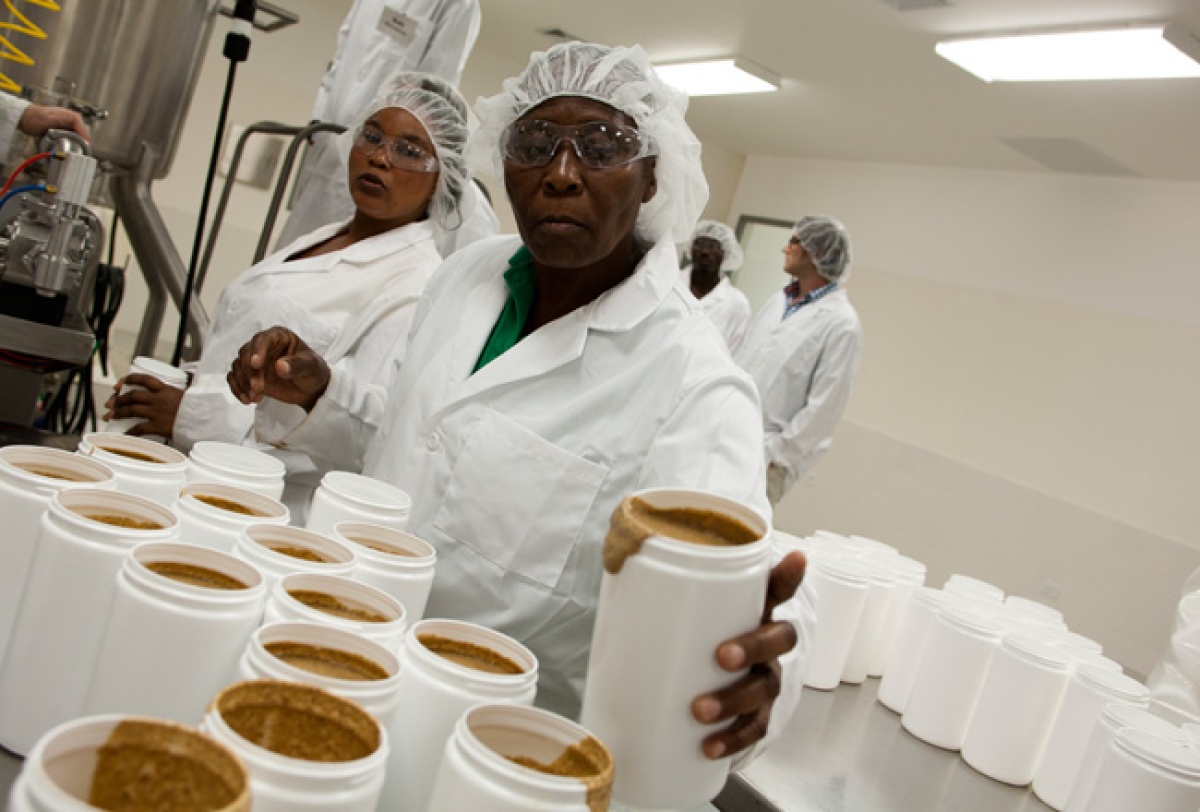Nourimanba: Fighting Malnutrition, Fighting Poverty in Haiti
Posted on Oct 2, 2013

A crew of Haitian workers clad in white lab coats, rubber-soled boots, safety goggles, and hair nets pass through a corridor and into a sterile production area that’s lined with hulking stainless steel devices, one of which looks like a giant KitchenAid Mixer. At 8:30 a.m., the machinery starts whirring and roaring. Before long, the distinct aroma of crushed peanuts hangs in the air.
From the outside, the two-story beige and white building looks like a standard warehouse you’d encounter on the outskirts of Des Moines or Bakersfield. But located in Haiti’s Central Plateau, the Nourimanba Production Facility—or Sant Prodiksyon Nourimanba in Haitian Creole—is a state-of-the art operation that’s helping tackle one of the country’s most pressing challenges—malnutrition.
In Haiti, malnutrition is the leading cause of death among children 5 years old and younger, according to UNICEF. The rural Central Plateau, where Partners In Health has worked for more than 25 years, has some of the highest rates of malnutrition in the entire country. And it’s not just children who are affected—pregnant women, teenagers, and HIV-positive patients, among others, all experience the disastrous consequences of poor nutrition.
“Every person has the right to eat food,” says Marie Landy Zamor, the nutrition coordinator at Zanmi Lasante, PIH’s Haitian sister organization. “Unfortunately, Haiti is such a poor country that many people don’t have the means.”
For decades, PIH has tackled malnutrition through a multipronged approach intended to alleviate the clinical, economic, and social factors that drive the condition. A key component of the strategy is Nourimanba, a ready-to-use therapeutic food. It’s similar in taste and texture to peanut butter, but it’s fortified with vitamins that are crucial to physical and cognitive development.
Quality & Quantity

Reginald Cean, director of agriculture for the Zanmi Agrikol vocational school, inspects the soil of a peanut farm in Corporant, Haiti. Photo: Rebecca E. Rollins/PIH
Making Nourimanba isn’t terribly difficult. But scaling up production so that every PIH/ZL patient who needs it gets it—while simultaneously bolstering the local economy and improving agricultural practices—poses a number of challenges. That’s why in 2010 PIH teamed up with Abbott and the Abbott Fund to build the Nourimanba Production Facility. Within a few months of officially opening this year, the facility has already created more than two dozen jobs and churned out more than 6,000 kilograms of the lifesaving treatment.
Most importantly, perhaps, it has spawned a reliable market for local peanut farmers to sell their yields, as PIH only sources locally grown peanuts.
“This center will have a major impact on the community—a lot of people are working here, and new industries help develop communities,” says Myrlene Arthus, production supervisor at the facility. “I love what I do because I am working for children that are sick. The product I make is helping save children’s lives.”
Peanuts and peanut-based products are finicky and prone to aflatoxins, a byproduct of mold that can be harmful. To ensure safety, the Nourimanba Production Facility has two on-site labs that are used to run a barrage of quality-control tests.
“The base of everything that we do is ensuring the quality of the product that we provide to our patients,” Oyama Michel Romain, director of operations at the facility, said. “It is a job that brings more value than simply money—it’s to help malnourished children and the country of Haiti.”
While important, the lab tests are only one part of a sophisticated production process that mitigates the risk of contamination and maximizes output.
Awe-inducing Automation

Oyama Michel Romain, director of the Nourimanba Production Facility, oversees day-to-day operations. Photo: Jon Lascher/PIH
The production process is a display of awe-inducing automation. Peanuts are first put through a propane-powered dryer then tested for aflatoxin, water content and similar indicators. When the all-clear is given, they move to the aptly named shelling room; remnant shells are collected and later turned into mulch while the nuts drop to a conveyor belt, where staffers carry out visual inspections. From there, the peanuts hit a corkscrew conveyor that directs them toward the roaster, which kills all bacteria. After roasting, the peanuts enter a cooling area that quickly reduces the temperature. Then it’s on to the grinder and mixer, where the “wet” ingredients are added. The final stop is a piston-filler that squeezes 1 kilogram of the now ready-to-use therapeutic paste into a plastic tube.
Each batch that moves through this process yields about 200 kilograms of Nourimanba, and PIH/ZL has the capacity to complete multiple batches a day. Technicians and sanitation staff, all of whom are locally hired and thoroughly trained, break down the machinery daily and meticulously clean it.
Zamor, the nutrition coordinator, is confident the increased output and high-quality treatment will allow PIH/ZL to treat more cases of malnutrition. But she says that massive, deeply ingrained challenges will continue to loom for decades to come.
“Treatment is important, of course. But so is prevention,” she notes. “Economic conditions, social conditions, schools, agriculture—they all need to improve before you can properly solve the problem of malnutrition.”

